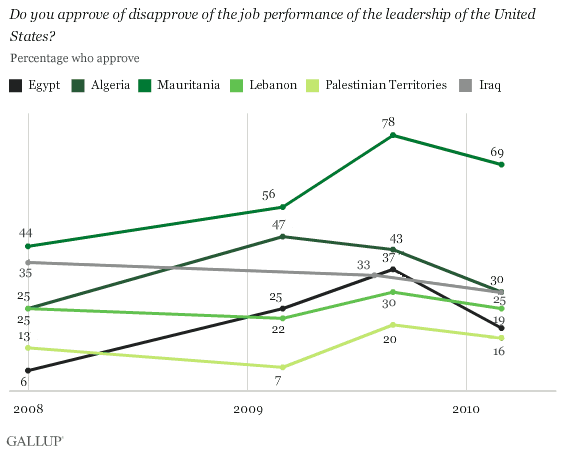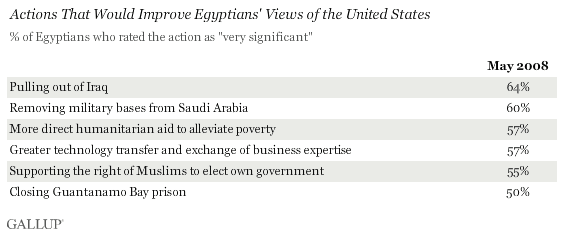WASHINGTON, D.C. -- Taking back some of the gains U.S. leadership enjoyed in 2009, four out of six Arab League countries Gallup has surveyed each year since 2008 are now less approving of U.S. leadership than they were in fall 2009. Egyptians' approval ratings have declined the most since last fall (18 percentage points), followed by Algerians' (13 points). Approval did not decline significantly in Iraq or the Palestinian Territories as the changes are within the margin of error.

The dips in U.S. leadership approval were recorded in Gallup surveys conducted in February and April 2010, ahead of the one-year anniversary of President Barack Obama's June 4, 2009, Cairo address, which aimed to restart U.S. relations with Muslim societies. The 2010 declines mark an about-face from the approval gains recorded in several Arab League countries such as Egypt (+19 points) and Algeria (+22 points) shortly after Obama's inauguration in 2009. In a number of countries, approval increased further after Obama's Cairo address -- including a 12-point increase in Egypt.
Egyptians' Hopes Not Realized
The country where Obama delivered his high-profile speech to the Muslim world is also the one where the swings in approval have been the largest. The precipitous decline in 2010 may reflect a perceived lack of progress on the issues many Egyptians said in May 2008 were most significant to improving their opinion of the United States: pulling out of Iraq, removing military bases from Saudi Arabia, supporting the rights of Muslims to elect their own governments, promoting greater economic development, closing Guantanamo Bay prison, and greater technology transfer and exchange of business expertise. In addition, an Egyptian government-sponsored survey conducted shortly after the Cairo address also found that Egyptians were most likely to identify the Palestinian-Israeli conflict as the most important issue the president's speech covered.

Though the Obama administration has made incremental headway on several of these issues, most notably on troop reduction in Iraq and fledgling entrepreneurship and technology partnerships with Muslim societies, none of these conflicts or ongoing challenges has seen breakthrough progress since the Cairo address. As U.S. troops continue to pull out of Iraq over the next several years, Egypt and other Arab nations hold elections, and new technology partnerships gain momentum, it will be important to watch how this affects Arab perceptions of U.S. leadership in the future.
For custom research from the more than 150 countries Gallup continually surveys, please contact us.
For complete methodology and specific survey dates, please review Gallup's Country Data Set details.
Survey Methods
Results are based on face-to-face interviews with 1,000 adults, aged 15 and older, each in Mauritania, Egypt, Lebanon, Iraq, Algeria, and the Palestinian Territories. The surveys were conducted annually in 2008, biannually in 2009, and the 2010 measure was the first of two this year. For results based on the total sample of national adults, one can say with 95% confidence that the maximum margin of sampling error ranges from ±3.1 percentage points in Egypt to ±3.9 percentage points in the Palestinian Territories. In addition to sampling error, question wording and practical difficulties in conducting surveys can introduce error or bias into the findings of public opinion polls.
